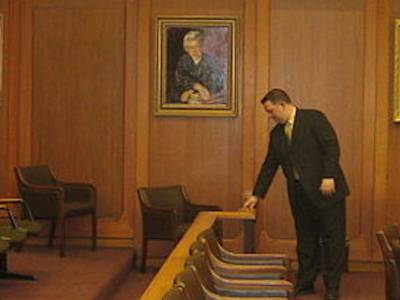I've seen some posts regarding the two year graduate entry LL.B. degree in the UK but needed to clarify something. I was reading the rules for the NY Bar Exam and it said that if you cannot fulfill either the durational or substantive requirement then you can do so by way of an LL.M.
Here's my question. I'm currently doing my 2 year LL.B. at the University of Edinburgh. I have an undergraduate degree from the University of Texas. If I wish to take the NY Bar exam, is it possible for me to do so with an LL.M. in teh US and if so, does the LL.M. have to be a "generalised" LL.M. degree so as to fulfill the requirement of courses taken in the American legal system or can it be an LL.M. in a specialised field such as taxation? Any thoughts would be appreciated. Many thanks.
2 year graduate entry LL.B. and the New York Bar
Posted Apr 28, 2006 21:59
Here's my question. I'm currently doing my 2 year LL.B. at the University of Edinburgh. I have an undergraduate degree from the University of Texas. If I wish to take the NY Bar exam, is it possible for me to do so with an LL.M. in teh US and if so, does the LL.M. have to be a "generalised" LL.M. degree so as to fulfill the requirement of courses taken in the American legal system or can it be an LL.M. in a specialised field such as taxation? Any thoughts would be appreciated. Many thanks.
Posted Apr 29, 2006 23:53
I can't answer your question, but I am curious. If you have a US undergraduate degree, why did'nt you just get a JD from a US law school? As it stands now, you are going to spend 3 years in law school (2 for the LLB, 1 for the LLM), which is the same as number of years it would have taken for you to get the JD in the US.
Posted Apr 30, 2006 13:49
Cuz my wife is Scottish and I moved here with her. Now she wants to move back to the US. Women, they make you jump through hoops for them...
Posted May 13, 2006 11:46
I'm a graduate of the Edinburgh University LLB two year conversion course, and I've been looking into this in some detail. It seems to me that reading the NY Bar info, there is a problem in that an LLM cannot cure both a durational and substantive deficiency. Two year LLBs definitely have a durational problem- but as I understand it, it can be also quite difficult to convince the Bar Board that a Scottish law degree is also substantively equivalent. If that's the case, then two year Scottish LLB grads are stuffed, because an LLM cannot also fix a substantive deficiency. The Scottish system is not the same as the English Common law- it has elements of it, but it's not accurate to say it is "based" on the English common law which seems to be what the NY Bar Board are looking for.
I've obtained a letter from the Dean of the Law School to say that in his opinion the Scottish LLB is substantively equivalent, and I am about to send off the documentation to the NY Bar Board for an assessment. I gather from friends in the US that it is largely discretionary- it may help that I am a fully qualified solicitor with over two years PQE, but we'll see.
If anyone else has any info on this, please let me know. I'll post the findings when I hear back.
I've obtained a letter from the Dean of the Law School to say that in his opinion the Scottish LLB is substantively equivalent, and I am about to send off the documentation to the NY Bar Board for an assessment. I gather from friends in the US that it is largely discretionary- it may help that I am a fully qualified solicitor with over two years PQE, but we'll see.
If anyone else has any info on this, please let me know. I'll post the findings when I hear back.
Posted May 13, 2006 12:32
I am absolutely 100% certain that a 2-year LLB is NOT acceptable in fulfilling the durational element to sit the NY Bar. There is no exception to this rule; it must be a 3-year LLB and an LLM will not correct this.
Posted May 13, 2006 17:42
That is not my understanding from reading the court rules.
"Subdivision (b)(1)(ii) of part 520.6 permits certain applicants to cure either a durational or substantive deficiency by successfully completing further study at an approved law school in the United States. Specifically, if an applicant cannot satisfy the durational equivalency requirements of section 520.6(b)(1) but has at least two years of substantively equivalent education, or if the applicant cannot satisfy the substantive equivalency requirements of 520.6(b)(1)(i), the applicant may still qualify to sit for the bar examination by showing "that the applicant has successfully completed a full-time or part-time program consisting of a minimum of 20 semester hours of credit, or the equivalent, in professional law subjects, which includes basic courses in American law, in an approved law school in the United States."
A LLB is at least two years. Therefore an LLM CAN cure a durational deficiency. But what to be shown is that the two years of completed study is substantively equivalent, since an LLM CANNOT cure BOTH a durational and substantive equivalency problem.
"Subdivision (b)(1)(ii) of part 520.6 permits certain applicants to cure either a durational or substantive deficiency by successfully completing further study at an approved law school in the United States. Specifically, if an applicant cannot satisfy the durational equivalency requirements of section 520.6(b)(1) but has at least two years of substantively equivalent education, or if the applicant cannot satisfy the substantive equivalency requirements of 520.6(b)(1)(i), the applicant may still qualify to sit for the bar examination by showing "that the applicant has successfully completed a full-time or part-time program consisting of a minimum of 20 semester hours of credit, or the equivalent, in professional law subjects, which includes basic courses in American law, in an approved law school in the United States."
A LLB is at least two years. Therefore an LLM CAN cure a durational deficiency. But what to be shown is that the two years of completed study is substantively equivalent, since an LLM CANNOT cure BOTH a durational and substantive equivalency problem.
Posted May 13, 2006 20:20
believe me, I had to transfer to a 3 year llb after being rejected from the Bar exam with a 2 year LLB. The LLM does nothing to cure the deficiency.
Posted May 14, 2006 00:41
I think you can take the California bar with only a 2 year LL.B so long as you are already a lawyer in your home country.
Posted May 14, 2006 20:06
James, can you please explain the exact basis on which you were rejected from the NY Bar? I take it you applied for an evaluation of your foreign legal credentials? Did they cite a durational deficiency and if so, was it made explicitly clear that an LLM could never fix that? Because if that is the case I find it hard to understand why the rules specifically state that if you have two years of a substantively equivalent degree then you can fix a durational problem with a course of study at a US law school. That seems to be precisely what the LLM is designed for. It would be helpful if you could expound on your experience because there are a couple of people here who are interested in knowing the status of a two year LLB.
R.A.J. I'm aware that you can take the California bar exam as an admitted lawyer- I want to seek admittance to the NY bar though and there is no reciprocity with CA if you are admitted there.
R.A.J. I'm aware that you can take the California bar exam as an admitted lawyer- I want to seek admittance to the NY bar though and there is no reciprocity with CA if you are admitted there.
Posted May 15, 2006 01:16
I'm going back 4 years so the rules might have changed since then. All I know is that the LLM is supposed to enable those with 3 year LLB's from foreign countries other than the UK, Canada, New Zealand and Australia. If you did an LLB in the UK you can do the NY bar without an LLM. Those other countries must do a 3 year LLB PLUS an LLM. However, a two year LLB from the UK will not qualify you. The wording on the website is very confusing. The durational element can only be resolved with a 3 year LLB. I know this because I was rejected with a 2 year and was not given the option of doing an LLM to fix the issue. Again, that was 4 years ago so the rules may have changed since then. Good luck.
Posted May 16, 2006 23:27
Thanks for all the replies guys. Just on the point that Scots law is not really based on English law, I wanted to give my opinion. I think this argument doesn't actually have a lot of merit in my view, and I think it would be incorrect in my view to regard certain degrees as "based on English Common law" such as Indian law degrees or American law degrees, and not regard Scots law in the same category. Yes it IS true that Scots law is a mixed legal system with elements of civil law. That is because most of the early institutional writers studied on the Continent in civil law systems for lack of quality legal education in Scotland. But as the law stands today, it is every bit is much a common law system as any other. The only thing that makes a system a common law system is the reliance on precedent and scots law has just as much reliance on precedent as other common law systems. What distinguishes civil law systems from common law systems is that in the former the law exists in more of a codified form. But to say that American law is "based on the common law system" while Scots law is not is misleading. This is because not only does Scots law have just as bit as much reliance on precedent as American law does, but also because Scotland and England have the same highest court of civil appeal. There is, therefore, a lot of influence of English cases on Scots law, which are regarded as persuasive, though not binding. When I took Delict (the equivalent of Tort) my textbook was a Tort textbook written by a Cambridge lecturer and about 80 percent of the cases I studied were actually English cases.
I think the only reason the difference in Scots law and English law is more pronounced than it should be in the eyes of some is the fixation that some scots lawyers have with stressing the differences. This stress on the differences makes some neocivilians forget the similarities in the systems. If American law is based on "English common law" on the basis of reliance on precedent, than Scots law is as well. I would like to think that any State Bar, however dumb they are, ought to understand that.
Thanks again for the replies guys. Let me know if you have any other insights. Cheers!
I think the only reason the difference in Scots law and English law is more pronounced than it should be in the eyes of some is the fixation that some scots lawyers have with stressing the differences. This stress on the differences makes some neocivilians forget the similarities in the systems. If American law is based on "English common law" on the basis of reliance on precedent, than Scots law is as well. I would like to think that any State Bar, however dumb they are, ought to understand that.
Thanks again for the replies guys. Let me know if you have any other insights. Cheers!
Posted May 17, 2006 14:45
Oh, I absolutely agree, and this is largely what the letter I obtained from the Dean says. So with any luck, the NY Bar Board will take a similar view. That said, I thought it worth stressing the point so there is no misunderstanding as to the Scots law position, particulary in terms of this phrase "based on English common law".
I gather from discussions elsewhere that notwithstanding any such similarities, it still can be quite difficult to prove that a Scots law degree is "substantively equivalent" to a US law degree. Again, my understanding is this is largely a discretionary matter. I sent off the form today, and so I should have a better idea of the answer in about 8 weeks (or so).
I gather from discussions elsewhere that notwithstanding any such similarities, it still can be quite difficult to prove that a Scots law degree is "substantively equivalent" to a US law degree. Again, my understanding is this is largely a discretionary matter. I sent off the form today, and so I should have a better idea of the answer in about 8 weeks (or so).
Posted May 18, 2006 23:08
I am a Canadian student who is going into the 2 year LLB program at the University of London. I am quite interested in sitting the NY Bar as soon as I can. It seems to me that it is impossible to be eligible for the NY Bar directly from the 2 year LLB program. However, if I do an LLM in the United States right after my LLB, is it then possible for me to join this bar? There seems to be a variety of mixed singles from people posting on this site. What are some of my other options? Would a 1 year accreditation course exist in the United States for me to take that would allow me to sit the bar exam if the LLM does not work? If the LLM is applicable like someone else said, can anyone recommend 5-10 law school in the US ideal for preparing one to do well on the NY Bar and that would also be beneficial for future job perspectives?
Posted May 19, 2006 17:30
Are you attending London externally or internally at a London college? That makes a difference here. I am on the 3 year part-time LLB at Birbeck (American, living in London working in Finance sector, have an MBA already) which as far as NY is concerned is the same as the 2-year full time. I also have gotten mixed messages - in fact I cannot find a single source anywhere that can explain this for certain.
All I know for sure is some U of London internal grads (I know someone that went to Kings College 3-year LLB personally that did this) have sat for the NY Bar, and a few with 2-years I have heard have been successful, but it is not automatic and seems impossible to know for sure. The view at my college is a 2-year (or 3 year part time) PLUS an LLM will fix the durational requirement, but that seems to fly in the face of what was posted earlier on this thread. For me personally only New York Bar matters as I intend to return to NYC in a few years and never want to practice, just need the qualification as I (unfortunately) need to work with lawyers often in the line of financial work I do.
Reading the NY Bar rules it SEEMS that the 2-year plus an LLM (assuming you went to a london college and are not doing this externally) SHOULD qualify you, but I have yet to see conclusive proof of this anywhere.
Please let me know if you hear otherwise, next year I will need to transfer to the 4-year LLB part time if the 3-year LLB part time (same as 2-year you are on) doesnt work regardles of the LLM.
(Note: my company pays for my school so going another year is no big deal if that is what it takes for NY Bar)
All I know for sure is some U of London internal grads (I know someone that went to Kings College 3-year LLB personally that did this) have sat for the NY Bar, and a few with 2-years I have heard have been successful, but it is not automatic and seems impossible to know for sure. The view at my college is a 2-year (or 3 year part time) PLUS an LLM will fix the durational requirement, but that seems to fly in the face of what was posted earlier on this thread. For me personally only New York Bar matters as I intend to return to NYC in a few years and never want to practice, just need the qualification as I (unfortunately) need to work with lawyers often in the line of financial work I do.
Reading the NY Bar rules it SEEMS that the 2-year plus an LLM (assuming you went to a london college and are not doing this externally) SHOULD qualify you, but I have yet to see conclusive proof of this anywhere.
Please let me know if you hear otherwise, next year I will need to transfer to the 4-year LLB part time if the 3-year LLB part time (same as 2-year you are on) doesnt work regardles of the LLM.
(Note: my company pays for my school so going another year is no big deal if that is what it takes for NY Bar)
Posted Jun 06, 2006 12:35
I think there may be some difficulty being deemed eligible for the new york bar with an external LLB (see http://www.malet.com/Bar%20Admission/new_york_state.htm)
Posted Jul 11, 2006 02:17
Hi Guys - we defintely know that a two year LLB from the Univeristy of Buckingham on the six semester basis has satisfied the eligibity requirements for the NY Bar Exam. Furthermore, eligibility to sit the exam is considered on a case by case basis and most of the time luck!
Posted Jul 12, 2006 14:22
Yes, but the position may be different for Scotland than for England. That's what I am still trying to find out.
I wrote to the NY Bar Board nearly 8 weeks ago for an assessment of my credentials and hopefully will be getting a reply soon. I think they may exercise their discretion in cases where they think it appropriate for an applicant to take the bar exam- don't know if that can be considered "luck" as such. We'll see!
I wrote to the NY Bar Board nearly 8 weeks ago for an assessment of my credentials and hopefully will be getting a reply soon. I think they may exercise their discretion in cases where they think it appropriate for an applicant to take the bar exam- don't know if that can be considered "luck" as such. We'll see!
Posted Jul 12, 2006 19:48
I know 7 people who sat the NY bar with a UK LLB. 6 failed and 1 passed and another passed on his 3rd attempt. The exam is no walk in the park without an American legal background. Only Torts is similar, the other 26 topics you'll be starting from scratch. Unless you intend to practice in NYC don't bother wasting your time and money, it won't help you anywhere other than NY.
Posted Jul 13, 2006 14:13
I know of 3 people with a Scottish LLB- all passed on their first attempt having done only the bar review course. So I guess it really depends on the individual.
Other Related Content
Using the LL.M. to Take the American Bar Exam
Article Sep 19, 2016
Foreign-trained lawyers can use LL.M.s to gain bar eligibility in several US states, but should beware that eligibility requirements are continuously evolving.
Hot Discussions
-
Cambridge LL.M. Applicants 2024-2025
Oct 30, 2024 142,480 544 -
Oxford 2025-2026 BCL/MSCs/MJUR/MPHIL/MLF
1 hour ago 2,129 45 -
Harvard LLM 2025-2026
Nov 20 09:34 PM 1,787 7 -
Indian Tribes as US Jurisdictions of law attorney admission?
Nov 08, 2024 770 6 -
NUS LLM cohort 2025/26
Nov 17 05:40 PM 482 5 -
Scholarship Negotiation Strategy (BCL v. NYU LLM Dean's Graduate Scholarship)
Nov 09, 2024 1,049 4 -
EU citizen barred in the US -- will an LLM from an EU school help me practice law somewhere in the EU?
Nov 15, 2024 144 4 -
Cambridge LL.M. Applicants 2025-2026
1 hour ago 375 4




